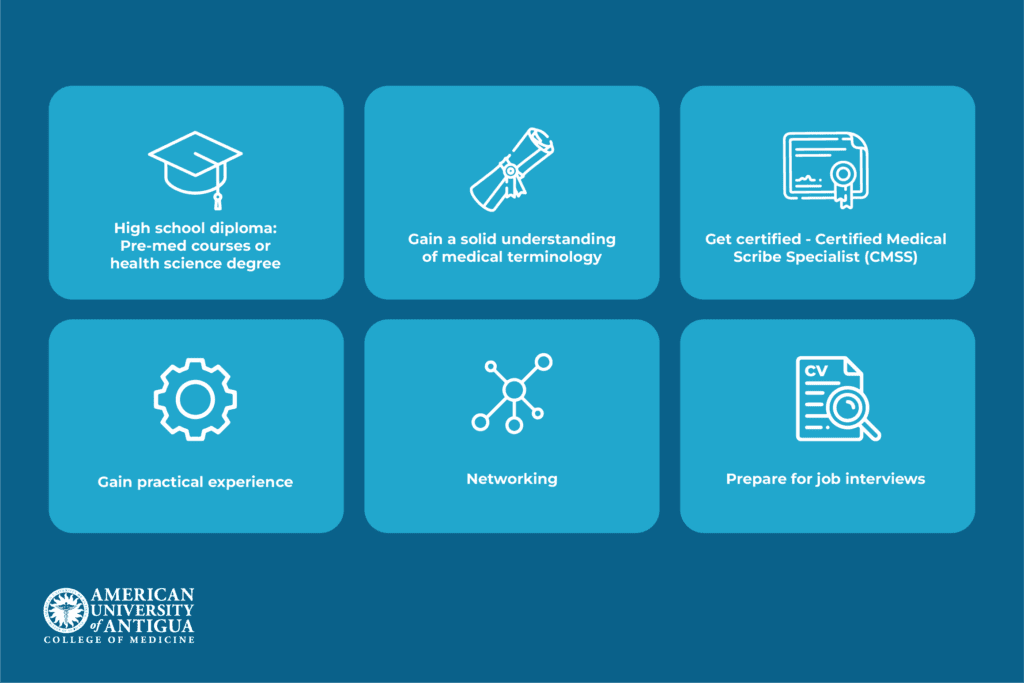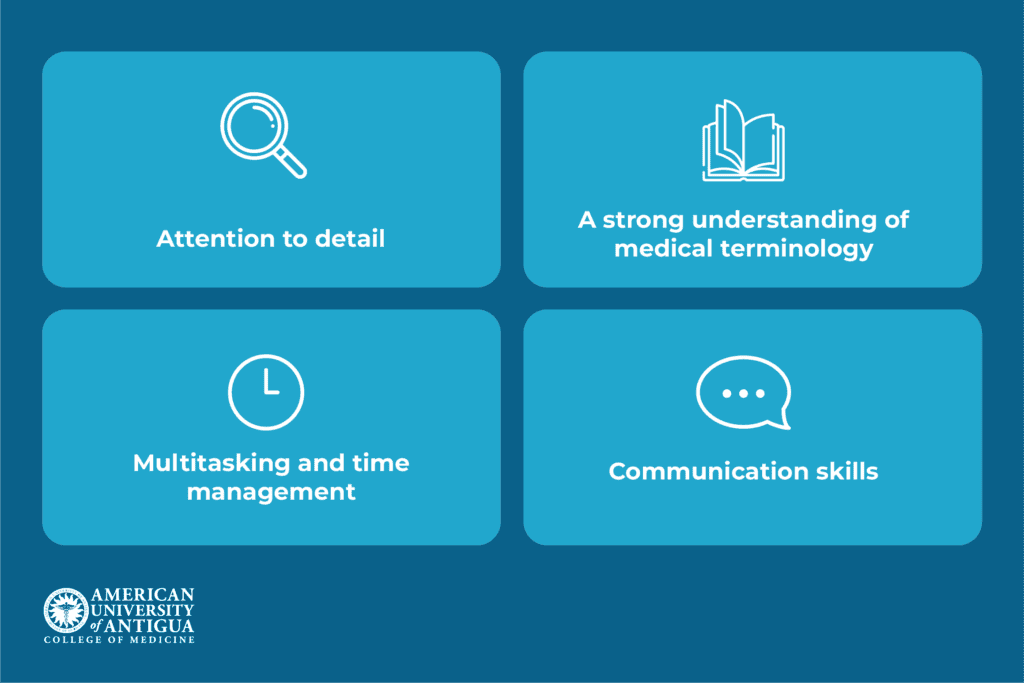What Is a Medical Scribe? Their Crucial Role in Healthcare
Medical scribes are essential in healthcare, assisting physicians with documentation so that doctors can dedicate more time to patient care. This crucial position is becoming increasingly essential in today’s fast-paced medical environment.
Imagine walking into a busy hospital where doctors rush between patients, striving to provide the best care while handling extensive paperwork. In this high-pressure scenario, who ensures that the physician can devote their full attention to patient care without getting bogged down by documentation? Enter the medical scribe – a key player in the healthcare team whose primary responsibility is to accurately document patient encounters in real-time. Medical scribes are becoming indispensable as they allow healthcare professionals to concentrate more on what truly matters: the patient. Whether you are a student exploring healthcare careers, a professional considering a new position, or simply a healthcare enthusiast, understanding the significance of medical scribes can provide valuable insights into the evolving landscape of modern medicine.
✅ Request information on AUA's MD program TODAY!
YOUR PATH TO SUCCESS BEGINS HERE
What Is a Medical Scribe?
A medical scribe assists healthcare providers by documenting patient encounters in real-time, managing medical records, and handling other clerical tasks essential for maintaining accurate patient histories. Originally introduced as a response to the growing burden of electronic health records (EHR) and extensive documentation requirements, the medical scribe’s role has evolved to become a vital component of the healthcare team.
As physicians face increasing demands to balance patient care with administrative duties, medical scribes have emerged as invaluable allies, helping doctors reduce time spent on paperwork and focus more on direct patient interactions. By efficiently handling documentation, medical scribes improve the workflow within clinical settings and enhance the overall quality of care, making them an essential part of the healthcare ecosystem.
What Does a Medical Scribe Do?
A medical scribe is primarily responsible for transcribing patient histories, documenting physical examinations, and recording other pertinent medical information during consultations, all in real-time as the healthcare provider conducts the appointment. This includes capturing details about the patient’s symptoms, diagnoses, treatment plans, and follow-up instructions, ensuring that the electronic health record (EHR) is accurate and up-to-date.
The role of a medical scribe can vary significantly depending on the healthcare setting. Scribes typically assist with routine patient visits in clinics, streamlining documentation for common consultations. When working in hospitals, they may handle more complex cases, including multiple specialties, and assist with rounds or surgical notes.
In fast-paced environments like emergency departments, scribes must quickly and efficiently document acute care scenarios, adapting to emergency medicine’s unpredictable and urgent nature. Regardless of the setting, medical scribes play a critical role in enhancing workflow efficiency, allowing physicians to focus on providing patient care without the distraction of extensive data entry and documentation tasks.
How to Become a Medical Scribe?

To become a medical scribe, the typical educational requirement is a high school diploma. However, many aspiring scribes pursue further education, such as pre-med courses or health sciences degrees. A solid understanding of medical terminology, anatomy, and healthcare procedures is crucial, as these skills enable scribes to accurately document complex medical information.
Attending training programs and obtaining certifications, such as the Certified Medical Scribe Specialist (CMSS) credential, provide targeted education and enhance employability and professional credibility. Gaining practical experience is equally important. Aspiring scribes can enhance their skills and familiarize themselves with clinical workflows by seeking internships, volunteer opportunities, or entry-level positions in healthcare settings.
Finding job opportunities, networking through healthcare connections, joining professional organizations, and exploring job boards specializing in medical careers can be effective strategies. Preparing for interviews involves demonstrating knowledge of medical documentation and terminology and showcasing strong communication skills, attention to detail, and the ability to work efficiently in a fast-paced environment.
Benefits of Having a Medical Scribe
Integrating medical scribes into healthcare teams has brought about significant improvements in how patient care is delivered and managed. By offloading the administrative burden of documentation from physicians, medical scribes enable doctors to dedicate more time to patient interactions, ultimately enhancing the overall quality of care.
Furthermore, scribes play a crucial role in optimizing clinical workflows, cutting down wait times, and enhancing the precision of medical records. These improvements enable healthcare providers to achieve better patient outcomes while creating a more efficient and satisfying experience for patients. The subsequent sections will explore the specific benefits of employing medical scribes across different healthcare environments.
For healthcare providers
Medical scribes significantly reduce the administrative load for healthcare providers by handling extensive documentation tasks. This allows physicians to concentrate more on direct patient care, enhancing their ability to interact meaningfully with patients and improving overall workflow efficiency. By streamlining clinical processes and minimizing data entry interruptions, scribes help decrease patient wait times and ensure more accurate documentation. This reduction in administrative responsibilities boosts provider satisfaction and mitigates burnout, fostering a more fulfilling medical practice.
For patients
Medical scribes ensure that medical records are accurate and comprehensive, which is crucial for effectively diagnosing and treating patients. Scribes manage documentation so physicians can fully engage with patients, leading to more focused and meaningful consultations. This improved interaction quality enhances communication, allowing doctors to address patient concerns more thoroughly and better tailor healthcare plans.
Additionally, detailed and accurate records help prevent errors and support better clinical decisions, ultimately leading to improved health outcomes and a more positive healthcare experience.
For healthcare institutions
Medical scribes significantly enhance overall operational efficiency within healthcare institutions, contributing to cost savings and improved patient satisfaction scores. By streamlining the documentation process, scribes help reduce the time physicians spend on administrative tasks, allowing them to see more patients and manage their caseloads more effectively.
This increased efficiency can help lower operational costs associated with burnout and turnover and reduce overtime expenses. Studies have shown that institutions employing medical scribes experience fewer documentation-related errors and improved patient throughput.
Research indicates that medical scribes significantly enhance overall physician satisfaction, improve chart quality and accuracy, and increase charting efficiency without diminishing patient satisfaction. Scribes are emerging as a valuable strategy for boosting healthcare efficiency and reducing physician burnout.
Furthermore, hospitals that implemented scribe programs saw improvements in the quality of clinical documentation and overall operational performance, highlighting the value of integrating scribes into healthcare teams for both financial and patient-centered benefits.
Key Skills Needed to Excel as a Medical Scribe
To excel as a medical scribe, several key skills are needed. Attention to detail is essential, as accurate documentation of patient encounters is vital for ensuring the reliability and completeness of medical records.
A strong understanding of medical terminology is also necessary, allowing scribes to accurately transcribe complex medical language and effectively communicate clinical information. Multitasking and time management skills are indispensable, as scribes must efficiently juggle documentation tasks while keeping pace with the fast-moving dynamics of healthcare environments.
Additionally, communication skills are paramount for interacting seamlessly with healthcare professionals and ensuring that patient information is recorded precisely. Effective communication helps scribes clarify any uncertainties with providers and ensures that all relevant details are captured correctly, contributing to high-quality patient care and well-organized medical records. Mastering these skills enables medical scribes to support healthcare teams effectively and contribute to a more efficient and accurate clinical environment.

Challenges and Considerations
Medical scribes face several challenges in their roles, including the high-paced nature of healthcare environments where they must swiftly adapt to changing situations while maintaining accuracy. The long hours and constant demand for precise documentation can be taxing, leading to potential stress and burnout. Managing accuracy under tight time constraints requires intense focus and quick decision-making, which can be mentally and physically exhausting.
Additionally, handling sensitive patient information brings ethical and privacy concerns, making it imperative for scribes to uphold strict confidentiality and adhere to HIPAA privacy regulations. Job satisfaction can be affected by the pressures of the role, and burnout is a real risk if not managed properly.
To mitigate these issues, scribes should seek strategies for managing stress, such as regular breaks, mindfulness practices, and a balanced work-life schedule. Effective stress management and supportive work environments can help preserve job satisfaction and ensure that scribes remain engaged and healthy in their crucial roles.
Average Salary for Medical Scribes
As of July 29, 2024, the average salary for a medical scribe in the United States is approximately $38,849. Typically, salaries for medical scribes range from $32,371 to $42,755, reflecting variations based on several factors.
Geographic location plays a significant role, as scribes in metropolitan areas or regions with a higher cost of living often earn more. Experience level and certifications also influence compensation, with more experienced scribes or those holding specialized certifications, such as the Certified Medical Scribe Specialist (CMSS), generally commanding higher salaries.
Additionally, the type of healthcare facility – private practice, hospital, or specialty clinic – can impact salary levels. As the demand for medical scribes grows, driven by the increasing complexity of healthcare documentation and the push for improved efficiency, compensation trends are expected to rise, potentially leading to higher salaries and enhanced benefits.
Conclusion
In summary, medical scribes enhance healthcare efficiency by alleviating administrative burdens, ensuring accurate documentation, and improving patient care. Their role benefits physicians, patients, and healthcare institutions alike. If you’re interested in a dynamic and impactful career in healthcare, consider exploring opportunities to become a medical scribe.
Frequently Asked Questions
Is it hard being a medical scribe?
Being a medical scribe can be challenging because of the fast-paced environment and the need for precise documentation. Still, with training and strong organizational skills, it is a manageable and rewarding career choice.
Is medical scribe certification worth it?
Yes, obtaining medical scribe certification, such as the Certified Medical Scribe Specialist (CMSS) credential, is worth it as it enhances job prospects, demonstrates professional competence, and can lead to higher salary opportunities.
✅ Request information on AUA's MD program TODAY!